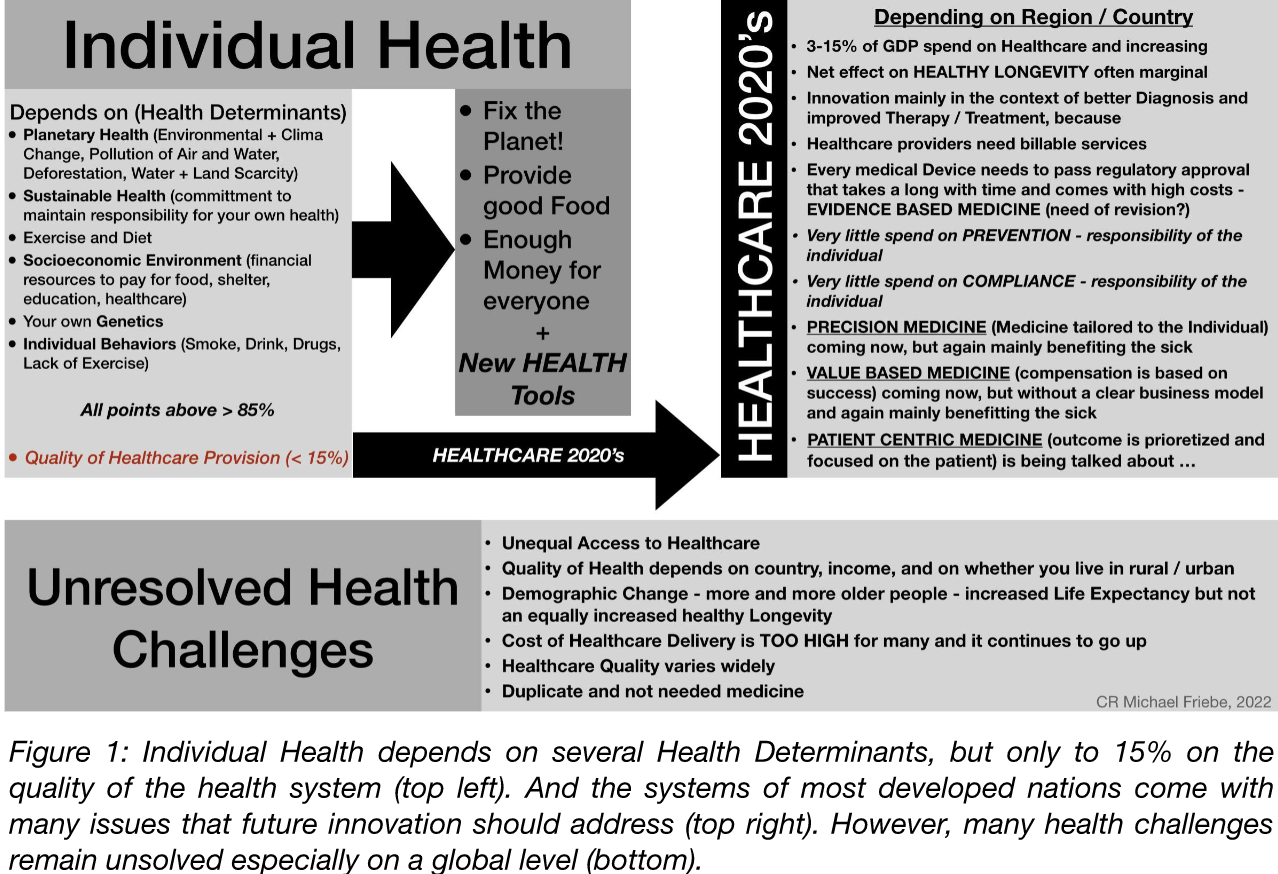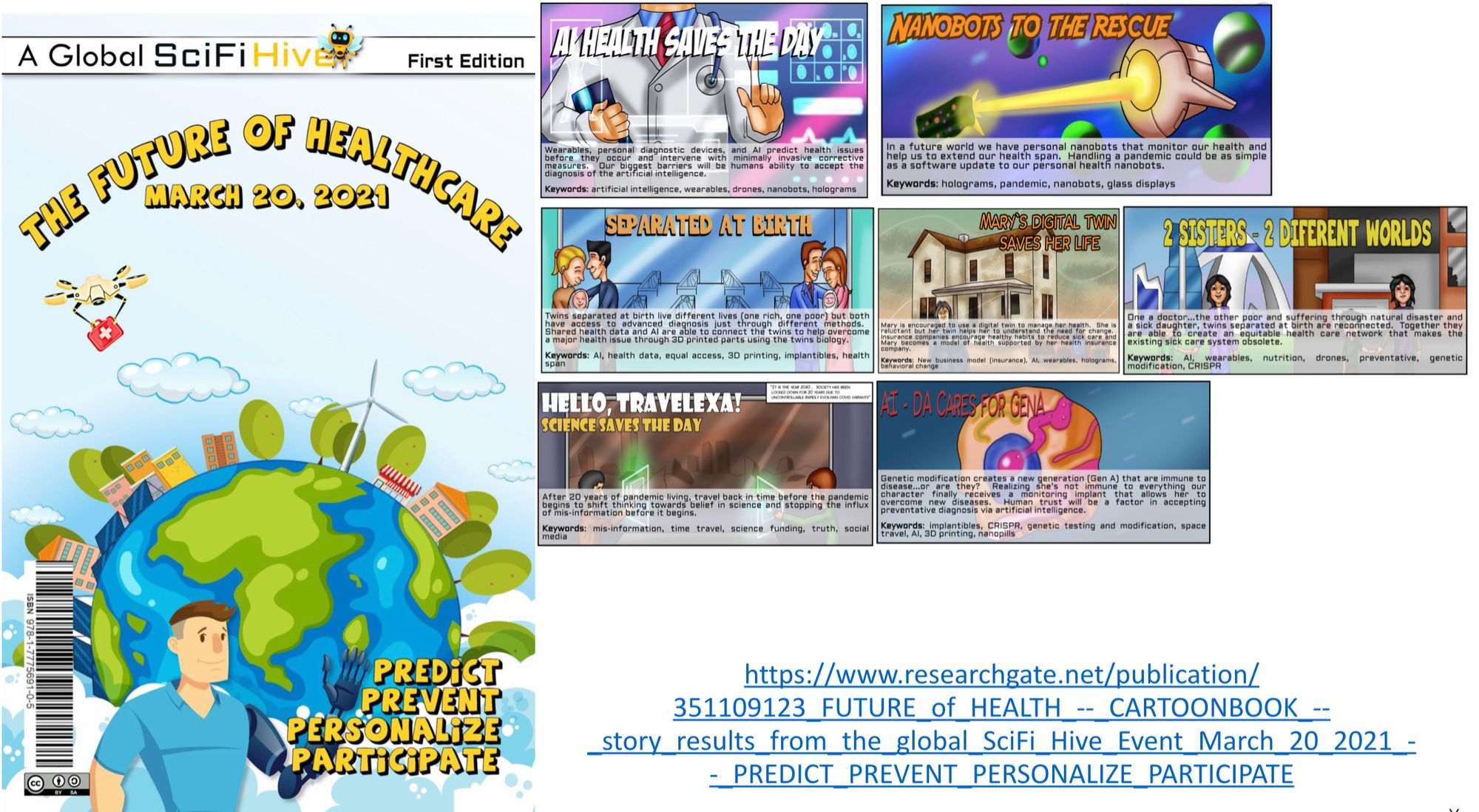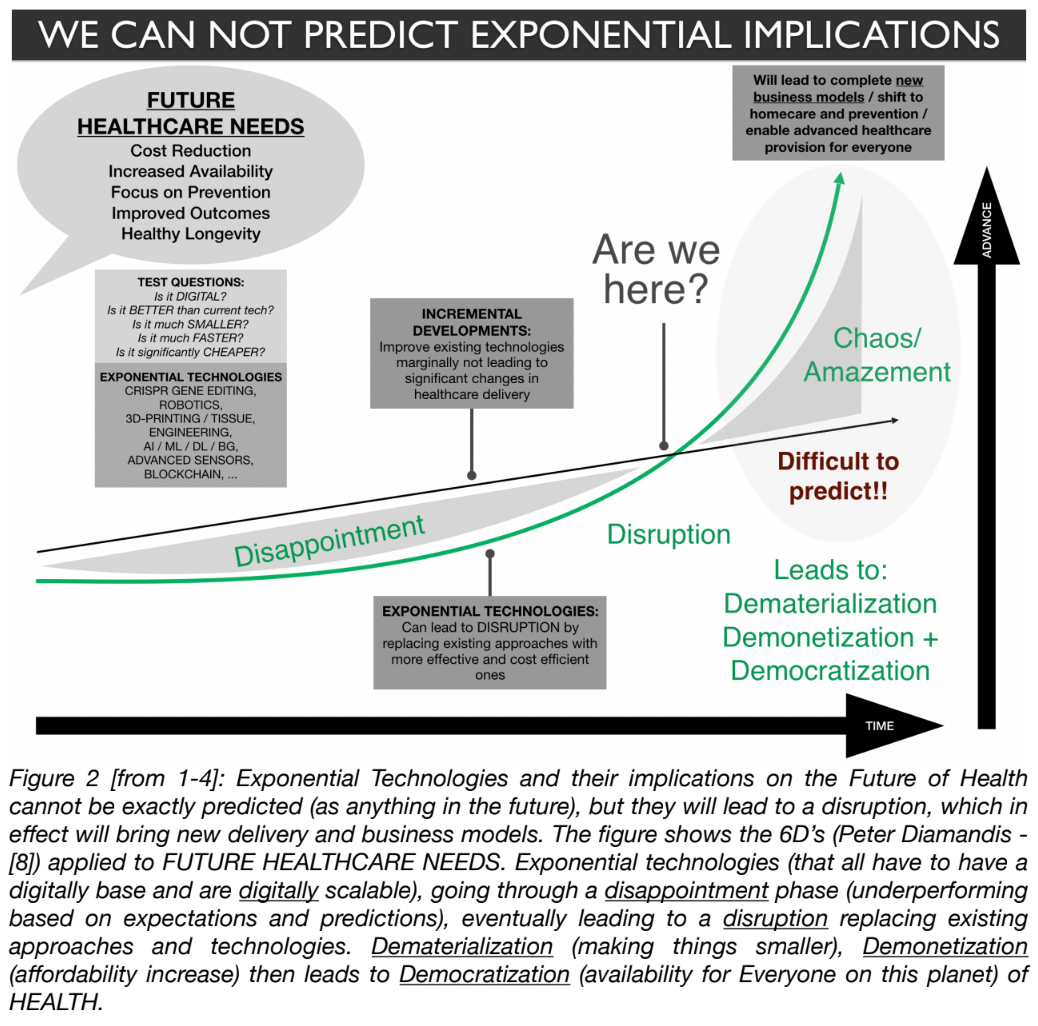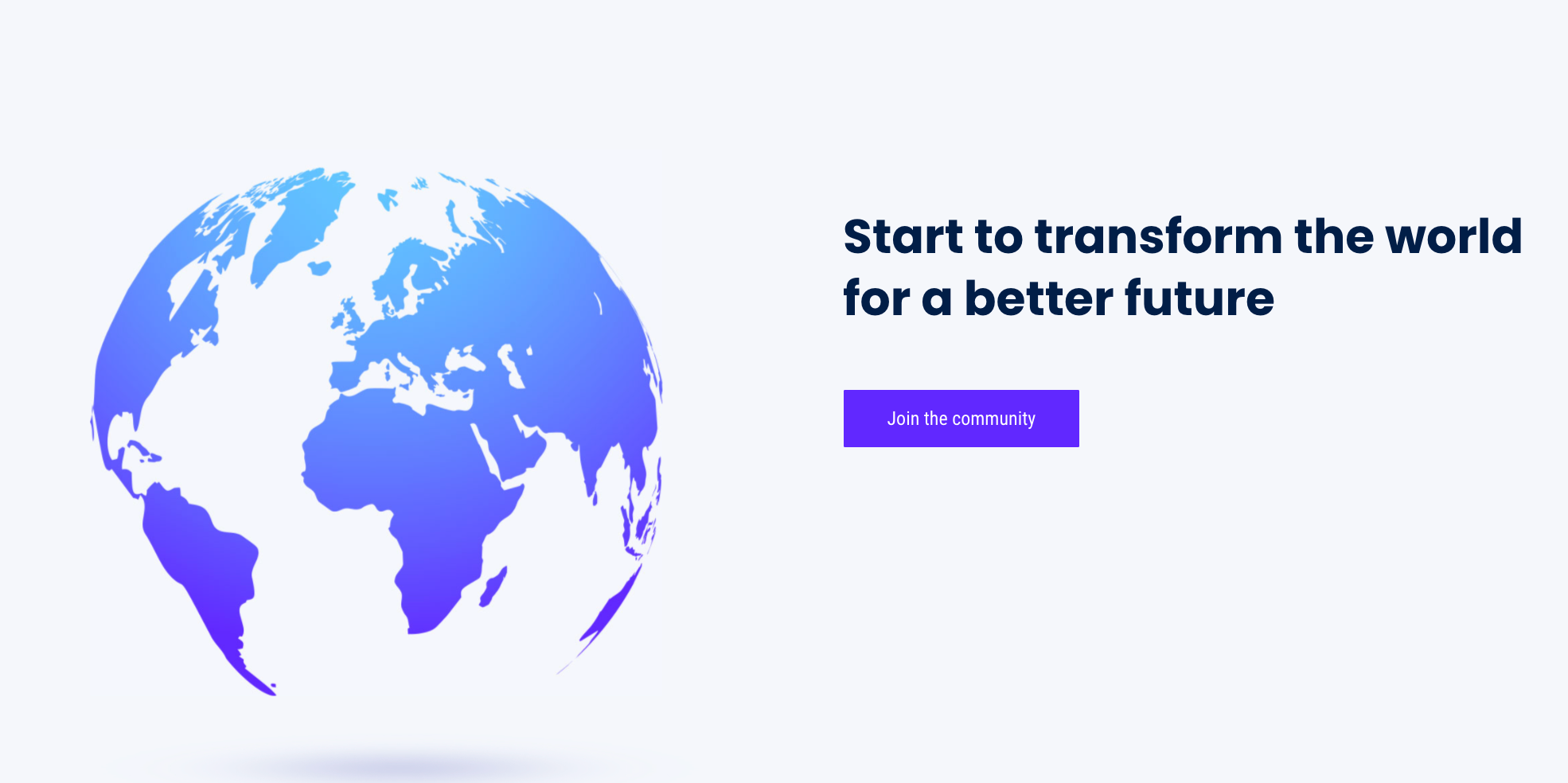
The DIGITAL TWIN Concept — Healthcares Transition Towards Homecare — The Making of an Exponential Health Metaverse
Next Generation Healthcare systems will need to focus on prevention / early detection and pro-active therapy, and they will employ exponential technologies. This likely will lead to significant changes in the way we experience, think about, and deliver healthcare.
Michael Friebe, PhD; Chief Health Disruptor — www.friebelab.org
There are significant challenges in global healthcare. Some countries have abundant services but are stuck with a rather nimble and expensive system that focuses on incremental innovations. Other geographies are still in need of basic tools, infrastructure and require completely different, inexpensive, and with that more disruptive solutions to satisfy their healthcare needs. Big discrepancies!
Next Generation Healthcare systems will need to focus on prevention / early detection and pro-active therapy, and they will employ exponential technologies. This likely will lead to significant changes in the way we experience, think about, and deliver healthcare.
Important in that context is to also rethink the current health business models that are currently based on reimbursing and paying for services of patients rather than on preventing people from becoming patients. We need to at least partly incentivize towards a desired change, so away from diagnosis and therapy to personalized monitoring and prevention. Only 3% of the total healthcare budget is currently invested in high income nations in personal health prevention!
With all that, there is a need to design future-oriented 21st-century health tech systems that are based on discovering and evaluating the actual needs of the individuals rather than basing it on the needs of the healthcare providers. Many unresolved Health Challenges remain, and upcoming technology developments will help to address them if the underlying problem is really understood and forward projected (see Figure 1).

For that we need to employ an innovation methodology that is
- purpose driven,
- that should benefit the individual,
- should try to resolve some of the big issues in global healthcare, namely inequalities, inaccessabilties, focus on prevention rather than treatment, healthy longevity, but it should also help to
- reduce health-associated costs and the focus on generating revenue through billable services
The 6D model, originally developed by Peter Diamandis [3,4] (see Figure 2), describing exponential technologies is also the base to understand the future development needs in healthcare and the likely processes that we will experience with ongoing developments towards a disruption of the current way we perform, understand, and act with respect to our own health. Healthcare needs to be demonetized and democratized!
This does not only involve a mindshift change with respect to how we approach health innovation, but it also requires novel education approaches involving multi-disciplinary teams, rethinking the health-related financing and investments, motivations to adapt through changes in health politics, and a push to a more sustainable health for everyone.
Sustainable health can only develop if environmental conditions (e.g. good air and water quality, sufficient supplies of healthy and balanced food, education opportunities), economic stability (personal income, balanced society), is matched with health that treats you when you are sick, but that has the main goal to prevent you from getting sick by employing predictive and participative tools and delivers high-quality care without damaging the environment.
It needs to focus on creating health at a population level (ONE HEALTH), while also being conscious about the enormous quantities of energy, waste (toxic and non-toxic), materials, water, and chemicals it uses or produces.
All of these ideas, wishes, and demands need to be embedded in a health business model that embraces and incentivizes initiatives, products, and developments based on new health metrics.
Last year we organized a dedicated FUTURE OF HEALTH online Science-Fiction cartoon creation event with over 150 participants. The goal was to tell a story of what healthcare will be able to do or should allow us to do with a 20-year time horizon from an individual perspective.

This daylong event produced 7 great and insightful stories [5]. Gene editing CRISPR technology, Artificial Intelligence, 3D Printing, Wearables as well, as Prevention and Health Monitoring were mentioned in several of the stories. And interestingly enough the main place for health-service and monitoring was seen at home (or anywhere with mobile devices) and not at a hospital or primary care physician.

It reflects the wish of the individual to be in the center of the healthcare provision, but who currently has to deal with a healthcare setup that provides a complicated and expensive setup for fixing health issues.
We have actually used these type of future looks and storytelling in the past to create initial health device and service solution concepts [6].
Even if these are seen as being to far away from current reality and too disruptive, they could be used to go backwards from a future perspective to the present and define incremental innovation steps that should be available in 1 year, 3 years, or 5 years to reach that vision.
The new digital-based technologies - also already mentioned in these cartoons - could provide new solutions and approaches for value creation in the healthcare space, and provide new product and service innovations, including involving 3D printer, (semi) autonomous robotic systems, self-learning diagnostic systems, data integration and evaluation [7].
There is no doubt that health digitization is just at the beginning and will gain significant speed in the coming years. It will be WEB 3.0 and METAVERSE based and will use digital companions and digital twins to monitor individual conditions and health-related developments (see Figure 3).

These technologies will also help the move towards value-based medicine, but at the same time, change the roles of many of the current stakeholders.
Medtech companies will need to change from being hardware providers to intelligent software companies that also provide health sensors with the data outcome being immediately integrated into a electronic health record. They will also need to cooperate much more with competitors and with data companies. And they will need to add products and services for a home care platform with separate devices, sensors, and data analytics.
A home care platform and the collected data points for health status monitoring will create a personal health record that will be combined (data merge and integration) with the systems and deep-tech information is collected in the electronic health record of the professional care system. This will lead to a Digital Twin that can answer health-related questions in the following segments
• Diagnostic: Why certain health events happened?
• Predictive: What will possibly / likely happen in the future?
• Prescriptive: What can we do right now or in the near future to prevent that from happening?
And, it will quickly be able to move healthcare delivery from acute care to mid-level or even homecare and simultaneously reduce healthcare cost significantly while increasing the quality of life (see Figure 4).

All these efforts will go in parallel and synchronized with the METAVERSE developments. Whether and how that will include NFT’s is not clear, but certainly, it needs to be combined with some form of data decentralization and blockchain securities and likely could be using 3D data and a 3D presentation space (utilising Augmented and Mixed Reality Applications) and be embedded in a Web 3.0 setup.
Commercialization of Health data is already a big topic, but this could lead to a new form of colonization and exploitation and should also be questioned from an ethics perspective. The authors opinion is that health data should be made openly and globally available if the user has been approved by the data owner (in the opinion of the author, that is and should be the individual) and that the raw health data should not be owned and exploited by companies.
- Screw business as usual (title of a book from Sir Richard Bransom) - we need to adapt such a mentality for Future of Health Innovations
- There are many many many innovation opportunities, but there is also a reluctance by institutions and clinicians to adapt them (does not fit their business model, already invested capital in infrastructure, and systems have not been amortized)
- Value propositions for devices and tools that improve current healthcare delivery need to obviously improve the service quality. They also need to be patient-centered and improve the experience (decrease frustrations) of the clinical staff. Most importantly, they need to lower the costs significantly! - THE QUADRUPLE AIM OF HEALTH INNOVATION DEVELOPMENTS
- Future value will be created if devices / tools will use health data and monitoring for Disease Prediction and with that help Prevention. They will also need to be Personalized to the individual user. But the Participation of the individual in their own health is of course required!
- Individual Health Data will be collected at home (Personal / Home Health Record) and merged with the data points from professional care (Electronic Health Record) to create a comprehensive DIGITAL TWIN, which would be an intrinsic part of a HEALTH METAVERSE.
- Health data safety needs to be guaranteed (Blockchains, Decentralisation), but it should be questioned on whether individual health data should carry a price tag and have a commercial value.
- Deep-Tech and other exponential health technologies will provide predictive, prescriptive and diagnostic information towards a prevention medicine
- Current Innovations are mainly based on 10% (Incremental) approaches, because with that they fit into the existing business models. Future innovations need to embrace a >10 X goal even though a fitting business model is not defined yet.
- The human component is and will be very important in the entire health delivery process, but the reluctance to accept and embrace novel technologies because of fear of changing environments needs to be eased by safeguards
- Politics will need to be more proactive and act on behalf of the patient needs and to address Planetary and Sustainable Health
References
[1] Friebe M (2020). Healthcare in need of innovation: exponential technology and biomedical entrepreneurship as solution providers (Keynote Paper). Proc. SPIE 11315, Medical Imaging 2020: Image-Guided Procedures, Robotic Interventions, and Modeling, 113150T (16 March 2020); doi: 10.1117/12.2556776
[2] Kraft D (2016). The Future of Healthcare Is Arriving — 8 Exciting Areas to Watch.”https:// singularityhub.com/2016/08/22/exponential-medicine-2016-the-future-of-healthcare-is- coming-faster-than-you-think/ (2016)
[3] Diamandis P (2016). Disrupting todays healthcare system. http://www.diamandis.com/blog/disruptingtodays-healthcare-system (2016).
[4] Diamandis P (2016). The 6 D’s. https://www.diamandis.com/blog/the-6ds
[5] Friebe M, Hitzbleck J, Merkel K (2021). SciFi HIVE - Future of Health - Global Workshop. Cartoonbook available at https://www.researchgate.net/publication/351109123_FUTURE_of_HEALTH_--_CARTOONBOOK_--_story_results_from_the_global_SciFi_Hive_Event_March_20_2021_--_PREDICT_PREVENT_PERSONALIZE_PARTICIPATE
[6] Friebe, M., [International Healthcare Vision 2037 (2017). New Technologies, Educational Goals and Entrepreneurial Challenges], Otto-von-Guericke-Universität, Magdeburg, ISBN: 978-3-944722-59-7.
[7] Porsche Consulting - Digital Medtech Transformation - available at www.porsche-consulting.com
Photo credit: AI created images based on the input: Future of Health Innovation Design. Michael Friebe June 2022 – https://huggingface.co/spaces/dalle-mini/dalle-mini
The above article is a significantly shortened mix of two chapters from the upcoming SPRINGER NATURE book - ISBN-13: 978-3031081903 – 25 authors, 49 chapters, 670 pages, over 100 illustrations, forewords from Dr. Peter Diamandis, Dr. Shafi Ahmed and Dr. Evelyne Yehudit Bishof

ExO Insight Newsletter
Join the newsletter to receive the latest updates in your inbox.









